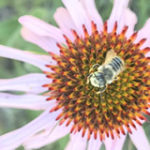V28-1, Fall 2014. Jenny Tollefson features Toothcup Rotala ramosior, Columbia Water-meal Wolffia columbiana, and Shining flatsedge Cyperus bipartatus in “Thriving in an Unlikely Place;” Peter Lesica and Jony Reny present field trip reports on Pyramid Pass, Nurses Lake (part of the annual meeting) and the annual Exploding Battery hikes; Gretchen Rupp recaps the Annual Meeting at Pine Creek along with Patrick Plantenberg’s story about “Grasses Have Class” and a photo gallery; in the context of a Small Grants Report, two essays by students involved the Missoula Waterworks Hill Weed Control Project discuss their findings; Kathy Lloyd’s article, “Rocky Mountain Maple: A Sweet Shrub,” is reprinted from a series in Helena’s Independent Record and includes more than just Acer glabrum; plus plenty of Chapter news as usual.
V28-2, Winter 2015. “Wild Mountain Heather,” by Dana Visalli reprinted from the Methow Naturalist in Washington State, discusses plant-fungus symbiosis in a number of plant species as well as some interesting characteristics of several members of the Ericaceae; the “2015 Annual Meeting: For Peat’s Sake… Befriend the Fens!” is announced by Marilyn Reynolds, Betty Kuropat, and Chantelle DeLay of the Flathead Chapter; a 2014 Small Grants Report, “Growing Programs at the Fort Missoula Native Plant Garden,” Lisa Bickell and Christine Morris relate the success of this garden to the larger mission of the Montana Natural History Center there; in a “Conservation Corner Update,” Peter Lesica describes some of the issues around importing exotic plants by the USDA; Peter Lesica also tells about the relationships between wild and domestic strawberries in “Strawberries: More Interesting than Just Jam;” Jim Habeck reviews research made possible by search tools available in “UM Herbarium Database Makes Searches Easy,” encouraging researchers to take advantage; and the issue includes an announcement that a new publication, “Montana Lichens: An Annotated List,” is available.
V28-3, Spring 2015. Steve Shelly discusses some of the unique ecological characteristics of the Swan Valley in, “Botanical Treasures in the Swan Valley: A preview of the MNPS Annual Meeting”; Kathy Settevendemie tells about “Celebrating Peter Stickney” for his many years of dedication to the legacies represented in the UM Herbarium today; Anne Garde describes the 2015 Small Grant Awards made in February; Jennifer Lyman describes management challenges and resource guides available for potential visitors in “Promoting the Pryors”; in “A Montana Spring Beauty,” Kathy Settevendemie describes Arrowleaf balsamroot – truly a “spring beauty”; and plenty of chapter and society news.
V28-4, Summer 2015. A mid-summer visit to Goat Flat in the Pintlar Mountains is described by Allison DeJong in “Tenacious Beauty: In Awe of Alpine Wildflowers,”; Elizabeth Pansing presents a Small Grant Report on “Germination and first year survival of Whitebark pine direct sowing efforts in Glacier National Park and the Greater Yellowstone Ecosystem”; Frank M. Dugan offers ethnobotanical memories of growing up on the south edge of Missoula in the early fifties in “Palouse Prairie: Synaptic Relics from a Senior Pseudo-Botanist”; and the regular news of the Montana Native Plant Society and comments by President Kathy Settevendemie.




